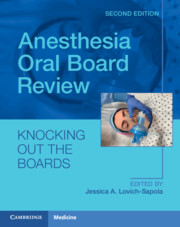Book contents
- Anesthesia Oral Board Review
- Anesthesia Oral Board Review
- Copyright page
- Contents
- Contributors
- Acknowledgments
- Letter from the Associate Editor
- How to Use This Book
- Format
- Applied Exam Tips for Success
- Part I General Information
- Part II Anesthetic-Related Critical Events and Information
- Section 1 Respiratory, Airway, and Ventilator Management
- Section 2 Cardiac, Thoracic, and Vascular Anesthesia
- Section 3 Neuroanesthesia
- Section 4 Renal and Urological
- Section 5 Hepatic and Gastrointestinal
- Section 6 Obstetric Anesthesia
- Section 7 Pediatric Anesthesia
- Section 8 Endocrine
- Section 9 Trauma Anesthesia
- Section 10 Emergency Events
- Chapter 80 Malignant Hyperthermia and Masseter Muscle Rigidity
- Chapter 81 Anaphylaxis
- Chapter 82 Patient Blood Management
- Section 11 Organ Transplant
- Section 12 Post-Anesthesia Care Unit
- Section 13 Acute and Chronic Pain
- Section 14 Other Situations
- Section 15 Safety and Ethics
- Index
- References
Chapter 82 - Patient Blood Management
from Section 10 - Emergency Events
Published online by Cambridge University Press: 03 August 2023
- Anesthesia Oral Board Review
- Anesthesia Oral Board Review
- Copyright page
- Contents
- Contributors
- Acknowledgments
- Letter from the Associate Editor
- How to Use This Book
- Format
- Applied Exam Tips for Success
- Part I General Information
- Part II Anesthetic-Related Critical Events and Information
- Section 1 Respiratory, Airway, and Ventilator Management
- Section 2 Cardiac, Thoracic, and Vascular Anesthesia
- Section 3 Neuroanesthesia
- Section 4 Renal and Urological
- Section 5 Hepatic and Gastrointestinal
- Section 6 Obstetric Anesthesia
- Section 7 Pediatric Anesthesia
- Section 8 Endocrine
- Section 9 Trauma Anesthesia
- Section 10 Emergency Events
- Chapter 80 Malignant Hyperthermia and Masseter Muscle Rigidity
- Chapter 81 Anaphylaxis
- Chapter 82 Patient Blood Management
- Section 11 Organ Transplant
- Section 12 Post-Anesthesia Care Unit
- Section 13 Acute and Chronic Pain
- Section 14 Other Situations
- Section 15 Safety and Ethics
- Index
- References
Summary
A 73-year-old female, following a motor vehicle collision, is scheduled for an urgent spine open reduction internal fixation (ORIF) due to a Chance fracture sustained while wearing a lap belt. Her medical history consists of congestive heart failure (ejection fraction is 35%), atrial fibrillation on warfarin (Coumadin) (current INR 3.1), iron deficiency anemia (hematocrit 27), and thrombocytopenia (platelets 78). She also takes aspirin 81 mg. How will you reverse the warfarin for surgery? How will you manage her anemia? Will you transfuse her prior to the surgery? What management strategies will you institute if blood loss is expected to be high? What if she refuses blood transfusion?
- Type
- Chapter
- Information
- Anesthesia Oral Board ReviewKnocking Out The Boards, pp. 342 - 346Publisher: Cambridge University PressPrint publication year: 2023

